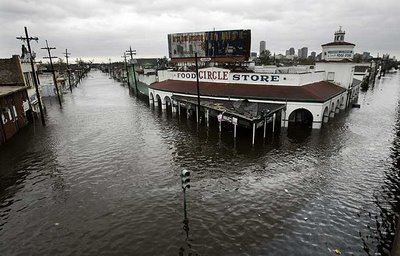
Bush's new budget slashes funding for the EPA's technical libraries. Accordingly, the EPA has already begun what it calls "deaccessioning procedures," despite the fact that Congress has not yet acted on the FY 2007 budget.
The U.S. Environmental Protection Agency is moving ahead this summer to shut down libraries, end public access to research materials and box up unique collections on the assumption that Congress will not reverse President Bush’s proposed budget reductions, according to agency documents released today by Public Employees for Environmental Responsibility (PEER).I'm reminded of Philip K. Dick's Counter-Clock World, in which the purpose of the library is to subtract from the sum total of human knowledge; it gathers information only to destroy it.
We all know that Bush prattles incessantly about freedom while taking drastic steps to restrict access to information. As rational people - and I don't mean that as a compliment, necessarily - we see this as hypocritical and dishonest. Maybe it isn't, though, or at least not entirely. Freedom from responsibility can seem very attractive indeed, and knowledge does have a way of imposing responsibility. (Adam and Eve found this out the hard way, or so I'm told.) The real problem may be that Bush and his followers are pursuing a more radical type of freedom than many of us can imagine wanting, let alone having: the freedom to act in accordance with desire and nothing else.
From its disdain for the law, to its love of rhetorical and literal violence, to its apoplectic outrage over "political correctness," modern conservatism seems like a case of self-actualization gone berserk. If you harbor racist feelings, its logic goes, you should be able to express them freely, and have them accepted as legitimate (or possibly even "scientific"). If you want to nuke Mecca - as all true patriots do - why should other people's facts or knowledge or doubts stop you from doing what comes naturally?
What's important is having the freedom to be yourself (assuming, of course, that you're not gay). To thine own self be true...even, or especially, if thine own self happens to be a willfully ignorant, world-hating bully by any reasonable person's standards.
After all, who's more qualified to save Western civilization than the people who view its everyday injunctions against viciousness, violence, selfishness, and bigotry as an insufferable tyranny?
The Bush Cult offers emotional relief to conservatarian sociopaths in much the same way that the Internets offer it to racists, Aldo Nova fans, and victims of obscure diseases: it says you are not alone. It's no wonder that one of the main things conservatives utterly reject (for themselves, at least) is shame. They want to go back to a sort of Eden, it seems, where no one will realize that they're naked.
We tend to assume that these people's antisocial behavior is oriented towards conventional goals (e.g., making money), instead of being a machine that goes of itself. "Bush does X because he wants Y," or so the story goes. When you believe this, you're liable to think that if you could somehow make Bush understand that doing X is not the best way of achieving Y, he might change his mind.
But what if Bush does X for the sheer pleasure of doing X? What if his desire is simply to act, just to prove that he can?
George Will, unsurprisingly, has already embraced this pathology:
If geologists were to decide that there were only three thimbles of oil beneath area 1002 [in ANWR], there would still be something to be said for going down to get them, just to prove that this nation cannot be forever paralyzed by people wielding environmentalism as a cover for collectivism.It's not just the money, in other words, and it's not just the oil. Perhaps it was, at one point, but what matters more is the principle that powerful people must demonstrate their power. Whether or not the demonstration makes any sense whatsoever is beside the point.
It's not much of a stretch to imagine a similar logic guiding the decision to attack Iran: it's worth doing even if the world goes up in flames, because the alternative is to let someone or something else be the "decider."
Which begs this question: How do you go about opposing a war that is made more likely by the fact that you oppose it?
I'm afraid I've strayed from the deaccessioning procedures of the EPA's technical libraries. The main issue here is that enforcement arm of the EPA uses information in the libraries to prosecute polluters; there's reasonable concern that important information may get permanently "lost" during deaccessioning, allowing lucky or well-connected criminals to go free. Another concern, which ties in somewhat with my previous ravings, is that deaccessioning is an attempt to wipe clean the EPA's institutional memory; it's the bureacratic equivalent of shock treatment.
There's money at stake here, and there are cronies to protect; these are the engines that traditionally drive politics, so perhaps there's no reason to look elsewhere for explanations. But BushCo's attacks on knowledge seem a bit too reckless, and go a bit too far beyond what's "necessary," for me to believe that it's all just a matter of corrupt pragmatism. They do these things because they want to, and to prove that they can.


























